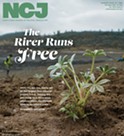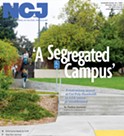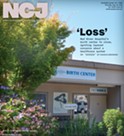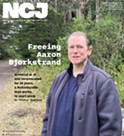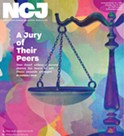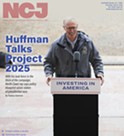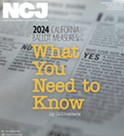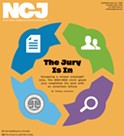
Photo by Tory Eagles, submitted
Tony Wallin-Sato, College of the Redwoods Pelican Bar Scholars graduate Bunthoeun Roeung, and special guest graduation speaker David Nguyen pose during the 2023 spring graduation in Pelican Bay State Prison.
[
{
"name": "Top Stories Video Pair",
"insertPoint": "7",
"component": "17087298",
"parentWrapperClass": "fdn-ads-inline-content-block",
"requiredCountToDisplay": "1"
}
]
On recent a sweltering afternoon, I was fortunate enough to get a personal tour of Los Angeles City Hall. Accompanying me was my new intern who had just been released after eight years of incarceration inside juvenile hall, as well as a recently released formerly incarcerated individual working at Homeboy Industries and an employee with Community Coalition - Los Angeles. Our tour guide was articulate, expressive and outfitted in a sharply tailored suit with spotless loafers. He also wore a contagious smile everyone we passed in the halls of the historic government building seemed to pick up. We took photos in the council chambers, observed ornate Japanese art on display and walked outside on the 27th floor with a 360-degree view of the Los Angeles basin.
The city employee giving us the tour also happened to be College of the Redwoods Pelican Bay Scholars Program's first college graduate David Nguyen, the Central Representative of Los Angeles and Asian American and Pacific Islander (AAPI) representative for LA Mayor Karen Bass. You wouldn't know he was incarcerated for 16 years — at least the police officers who greet him with, "Good morning, sir," every morning don't. My raison d'etre is to destigmatize, decolonize and decarcerate through storytelling, and there is no better example than my brother David.
It's been more than three years since I wrote about when David was freed ("David's Out," June 24, 2021) — our winter polar plunge in the Smith River, our jog beneath the Redwood canopies at Simpson-Reed Trailhead, his family reunion's warm embrace and the local community members who showed up on a crisp coastline morning to greet him upon his release. Back then we were still in the thick of the pandemic. The first Black, Asian and female Vice President had just been inaugurated, mostly white male domestic terrorists had stormed the capital with little opposition and resistance, and the police officer who knelt on George Floyd's neck for nine minutes and 29 seconds had been tried and convicted, and would soon be sent to prison. (Sadly, though, as I write this, a judge has thrown out the felony convictions on the officers who murdered Breonna Taylor.) All that seems so long ago and a lot has happened since.
Three years may not seem like ample time to tout the longevity of an accomplishment but for someone like David, it might as well be a decade. In his professional role, he now represents the mayor of the country's second largest city when she is unable to make a function, event, inaugural speech, grand opening, local community meeting or other happening in a city of almost 4 million inhabitants. He listens to community issues and helps build bridges to mend them, assists with small businesses and city development, and continues to change the narrative surrounding the formerly incarcerated.
At a recent event where David tabled, the organizer said in 30 years they had never seen anyone from the mayor's office attend. They told him they felt heard and seen. That is what David does — he makes you feel visible. When I met him in prison, he had the biggest heart of anyone I'd met and that still rings true today. He was building community inside and now he's continuing to build community outside. David is a real and approachable example of the potential for those of us currently or formerly incarcerated to be agents of change.
Like I said, a lot has happened since that beautiful day he walked off the grounds of Pelican Bay State Prison. Cal Poly Humboldt's BA in Communications program just successfully ended its second semester on the prison's B Yard, there are 34 formerly incarcerated Project Rebound students on the university's Arcata campus with nearly 20 graduates since 2020, College of the Redwoods now has a Rising Scholars Program specifically to support youth education inside Humboldt County Juvenile Hall and CR's Pelican Bay Scholars Program continues to thrive and works in collaboration with CPH's BA program.
Two years after his release, the illuminating fog and gossamer coastline called David back to the North Coast. A talented painter himself, he was the special guest for the opening reception of the Pelican Bay art exhibit in Reese Bullen Gallery held by Prison Arts Collective and Project Rebound. A few months later, David was back on the North Coast as the keynote speaker for the College of the Redwoods Pelican Bay Scholars Program graduation. There's nothing more inspiring than seeing someone from your yard come back in street clothes, no heavier symbolism for the possibility of freedom. As David spoke to his peers and men he lived with on both B and D Yard, he represented that hope.
Today, David and I are neighbors. We talk weekly and, when our schedules permit, we connect over a bowl of ramen or deadly spiced Thai fried rice. A few days ago, I hosted a formerly incarcerated poetry reading at the independent socialist bookstore between our houses. While we all read our original poetry, David chose to read the work of poets still incarcerated behind the walls, as well as passages from the first issue of Pelican Bay State Prison's newspaper, The Pelican, which he'd helped create, forever uplifting the voices from inside. After reading a few pieces, David said the next few poems were from his old cellie.
He pointed to a teenager in the crowd, smiled and told the audience, "This next piece is dedicated to him. This is your dad's poem."
David and I recently reminisced over breakfast about the transformative power education had on both of our lives. I asked him, now that he works as a public figure, how he handles conversations with people who don't believe in second chances or people who don't see people like us as redeemable.
He replied, "We were just as lost once, too, before we changed. We all have to see each other as human and just live by example."
Tony Wallin-Sato (he/him/they) is the Prison Education Director for California State University Long Beach, Project Rebound and a lecturer in the Critical, Race, Gender and Sexuality Studies Department at Cal Poly Humboldt. He is still currently on hiatus as an investigative journalist but will return to reporting in the near future.
Comments
Showing 1-1 of 1





